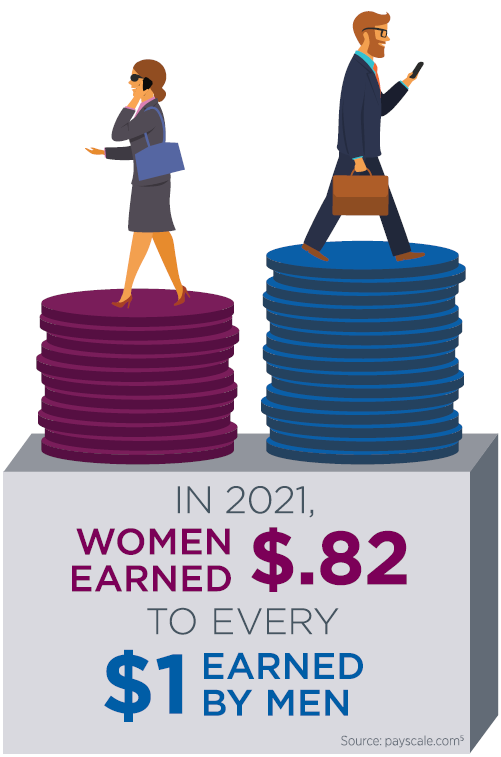Women Often Put Others First, Why Not Their Retirement Too?

Women juggle a lot of roles, from career professional to caregiver, but there’s one crucial thing most don’t do — take charge of their financial future.
A UBS study revealed that 85% of high-net-worth women across every generation manage day-to-day expenses but leave long-term financial decisions to men. Their reasons vary, from lack of investing confidence and encouragement to lack of financial education.1
As you think about the following five realities that you may be facing now or in the future, you might feel more empowered if you partner with a wealth advisor to create a financial plan you can adjust as you go through life changes.
Serving as Primary Caregivers
When a parent is aging or a family member is ill, women typically do most of the caregiving, from running loved ones to the doctor to helping with daily chores. They may also be raising children. Taking care of family can be rewarding, but it can also be stressful financially and personally. Cindy Hounsell, president of the Women’s Institute for a Secure Retirement, noted that, “If caregivers take time off work, not only do they lose pay, but also those lost wages can affect their Social Security, pension payouts and other savings, threatening their future finances.”
If you have taken months or even years off of work to be a caregiver, one of the best ways to make up for lost time is to work enough hours to help ensure you receive health care benefits and can participate in your employer’s retirement plan, setting aside as much pre-tax income as possible. You can contribute up to $19,500 to your 401(K) in 2021. If you are age 50 or older, you can make an additional $6,500 in catch-up contributions. If you aren’t in an employer plan, consider opening an IRA and contribute as much as you can. The maximum IRA contribution is $6,000 in 2021, with an additional $1,000 in catch-up contributions if you are age 50 or older, according to the IRS.
Potentially Ending Up with Less Social Security
If you have been a caretaker during your lifetime, your earnings years may be fewer, which means your Social Security benefit could be reduced. The reason is that Social Security is calculated based on your top 35 earnings years,2 and if you either don’t have 35 years of earnings, or in some years you earn much less, your monthly Social Security benefit could be lower, leading to reduced income throughout retirement.
To combat these types of shortfalls, a good strategy may be to plan on working longer during your lifetime to increase your earning years, which may also let you push back beginning to claim your Social Security benefit until age 70. Delaying when you start receiving Social Security bumps up your monthly benefit by as much as 132%.3
Living Longer Than Men
As a woman, you will likely live longer (age 81) than a man (age 76), according to CDC statistics, so you should build this fact into your long-term plan to help ensure you don’t outlive your retirement savings. And, your wealth advisor can help you estimate the extra amount you should save to account for any potential rise in inflation over time. For example, if you project you’ll need $9,000 a month to pay your expenses, then it’s a good idea to save an additional $1,000 a month as a buffer against inflation risks.4
Earning Less Than Men
In 2021, women earned $.82 to every $1 earned by men. This gap has decreased by only 8 cents since 2015.5
Given the long-term effects of the wage gap, accelerating savings whenever possible and working with your family to trim your expenses could help you put more toward long-term savings. Your advisor can help you create a plan to maximize your investments, choose tax-advantaged savings vehicles and determine how much to withdraw from your accounts during retirement.
Being Solely Responsible for Finances
You may go through challenging life experiences including the loss of your spouse or a divorce. And if you’ve never married, you may have always handled the ups and downs of managing your finances.
Regardless of personal circumstances, a research study showed women were at risk of not having enough retirement savings. Surprisingly, married women in their 50s in two-income households are at greater risk of being unable to maintain their current standard of living in retirement (46%), compared to married women in one-income households (32%) and single women who never married (39%). While counterintuitive, two-income households are likely spending more and saving less (not saving for the spouse too). About 50% of the couples surveyed for the study said that only one spouse participated in an employer’s retirement plan.6

When you plan for the long-term, it’s a good idea to account for the eventuality that you alone will have to manage your finances, unless you are single and that has always been the case for you. If you are married, it makes sense to ask your spouse to include you in retirement planning discussions and share account information, including balance amounts and passwords, so that you are informed about your financial picture. Consider asking your advisor to meet with you both, as a couple and as individuals, to help you feel more prepared for your future.
Putting a Plan in Place
Whether you are single or married, think about making your long-term financial plan as much of a priority as you do other parts of your life, such as being a caregiver. If you’re married, consider creating a long-term financial plan as if you are single, so you’re not overly dependent on your spouse’s savings.
Finding a Trusted Advisor
Seek out an advisor you think will understand your financial challenges, your role as a caregiver and difficult life changes you may face, such as the loss of a spouse or a divorce. If you prefer working with a woman, Mariner has female advisors you can consult with, three of whom — Valerie Newell, Jana Shoulders and Faith Reed Xenos — have been ranked in the Top 100 Women Financial Advisors by Barron’s.*
At Mariner, we take a personalized approach to creating a plan, listening to your challenges, hopes and long-term goals, and then working with you on a strategy to help meet your long-term needs.
Sources:
1 “Women Put Financial Security at Risk by Deferring Long-Term Financial Decisions to Spouses,” March 2019. UBS.
2 “Your Retirement Benefit: How It’s Figured,” Social Security Administration.
3 “Benefits Planner: Retirement.” Social Security Administration.
4 “How Living Longer Impacts Your Retirement,” May 2019. Forbes.
5 “The State of Gender Pay Gap,” payscale.com.
6 “Women, Marriage and the National Retirement Risk Index” June 2019. Center for Retirement Research at Boston College.
* Barron’s Top 100 Women Financial Advisors and Top Advisor Rankings by State are based on data provided by individual advisors and their firms. The State rankings draw from all 50 states, plus the District of Columbia, with the number of ranking spots distributed in proportion to state population and wealth. Advisor data is confirmed via regulatory databases, crosschecks with securities firms and conversations with individual advisors. The formula Barron’s uses to rank advisors is proprietary and has three major components: assets managed, revenue produced and quality of practice. Investment returns are not a component of the rankings because an advisor’s returns are dictated largely by the risk tolerance of clients. The quality-of-practice component includes an evaluation of each advisor’s regulatory record. The award is not indicative of future performance and there is no guarantee of future investment success. For additional information, visit www.barrons.com.
This article is limited to the dissemination of general information pertaining to Mariner Wealth Advisors’ investment advisory services and general economic market conditions. The views expressed are for commentary purposes only and do not take into account any individual personal, financial, or tax considerations. As such, the information contained herein is not intended to be personal legal, investment or tax advice or a solicitation to buy or sell any security or engage in a particular investment strategy. Nothing herein should be relied upon as such, and there is no guarantee that any claims made will come to pass. Any opinions and forecasts contained herein are based on information and sources of information deemed to be reliable, but Mariner Wealth Advisors does not warrant the accuracy of the information that this opinion and forecast is based upon. You should note that the materials are provided “as is” without any express or implied warranties. Opinions expressed are subject to change without notice and are not intended as investment advice or to predict future performance. Past performance does not guarantee future results. Consult your financial professional before making any investment decision.
Mariner is the marketing name for the financial services businesses of Mariner Wealth Advisors, LLC and its subsidiaries. Investment advisory services are provided through the brands Mariner Wealth, Mariner Independent, Mariner Institutional, Mariner Ultra, and Mariner Workplace, each of which is a business name of the registered investment advisory entities of Mariner. For additional information about each of the registered investment advisory entities of Mariner, including fees and services, please contact Mariner or refer to each entity’s Form ADV Part 2A, which is available on the Investment Adviser Public Disclosure website. Registration of an investment adviser does not imply a certain level of skill or training.

